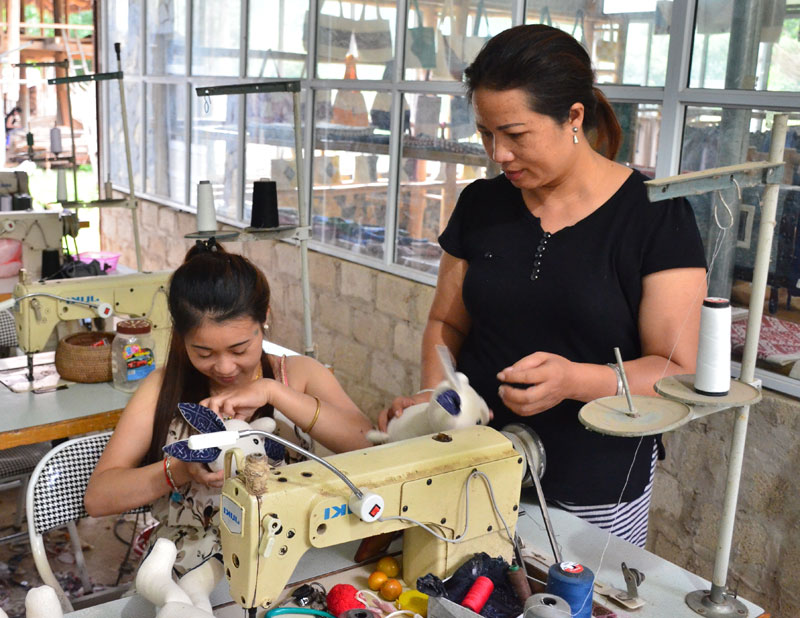
(HBO) – Upon arriving in Lac Village – located in Chieng Chau, in the Mai Chau district of Hoa Binh province – you will understand why the locals here have come to call Vi Thi Thuan, a Thai ethnic minority woman, "Co Tien”, or "Fairy” in English.

"Fairy” Vi Thi Thuan looks at the products made by a local
worker at the Thuan Hoa Social Protection Centre.
Her matronly name comes from her
dedication to caring for others and her ability to weave magic out of a
difficult situation.
Thuan decided to build a house for people
with disabilities in a bid that would not only allow them to make a living, but
also preserve the traditional art of brocade weaving. As such, the Thuan Hoa
Social Protection Centre was established on May 1, 2018.
Over the past decade, hundreds of women
with disabilities and those from difficult backgrounds have come to the centre,
which offers them stable employment and the opportunity to earn a living for
themselves.
The centre currently accommodates 35
ethnic minority women, including 11 people with disabilities, who are provided with
jobs and a stable income ranging from 2.5 to 4 million VND per month.
It was very challenging at the beginning
as this craft is difficult even for able-bodied people to master; for people
with disabilities, it can be a thousand times more difficult, Thuan recalled.
"I myself had no experience, only my courage
and enthusiasm, and so there were many times where I did not know what to do
first, and what to do later,” she said. "Fortunately, all the members here live
together in harmony, like the name of the centre "Thuan Hoa”. Thus, when
confronted with any challenges, we always encourage each other to overcome them
together.”
After many ups and downs, in 2016, the
centre was able to build a new workshop and separate rooms for 20 of the women living
here, as well as a showroom, two stilt houses for homestay services, and a
large yard for camping and the display of Thai ethnic minority items.
"Many difficulties remain ahead of us, but
we are still dedicated to crafting and selling traditional handicrafts that
reflect the cultural beauty of Thai people,” Thuan added.
In addition, she plans to develop a large
garden full of local flowers from the northwestern region in the future and
create a cultural space of Thai ethnic community in Mai Chau to serve tourism.
Thuan was awarded the title of brocade
weaving artisan by the Vietnam Craft Village Association three years in a row
from 2010 to 2013, and honoured by the President of the Vietnam Women’s Union
as an example of an excellent businesswoman from an ethnic minority group.
Hoa Binh province has carried out multiple programmes and initiatives to revive its cultural heritage which has gradually fallen into oblivion through the ebbs and flows of history.
The most prominent and defining feature in the prehistoric era of Hoa Binh is the Hoa Binh Culture. The Culture was first discovered in Hoa Binh. The significant prehistoric culture represents not only Vietnam but also Southeast Asia and southern China. Through excavations of cave sites in the limestone regions of Hoa Binh, French archaeologist M. Colani introduced the world to a "Stone Age in Hoa Binh province – Northern Vietnam" in 1927. On January 30, 1932, the First Congress of Far Eastern Prehistorians, held in Hanoi, officially recognised the Hoa Binh Culture.
Known as the "Land of Epic History”, Hoa Binh province, the gateway to Vietnam’s northwest, boasts a strategic location and a unique cultural tapestry woven by its ethnic minority communities.
The People's Committee of Luong Son District recently held a ceremony to receive the certificate recognizing Sau Communal House in Thanh Cao Commune as a provincial-level historical and cultural site.
Recognising the importance of cultural heritage preservation in protecting and promoting the value system of Vietnamese culture, and serving socio-economic development in the new period, Party committees and local administrations in Hoa Binh province have identified it as a key task in the cultural development strategy. The province has been making efforts in mobilising resources, creating consensus among people and engaging ethnic communities in preserving and promoting cultural identity.
Hoa Binh province has captured growing attention both domestically and internationally for its distinctive cultural heritage and rich history. Most notably, it has been renowned for its famous Hoa Binh culture, considered the cradle of ancient Vietnamese civilisation. Looking ahead to significant milestones in 2025 and the 140th anniversary of province establishment in 2026, Hoa Binh Newspaper presents a comprehensive overview of the province's development across economic, social, cultural, tourism, and security domains.



